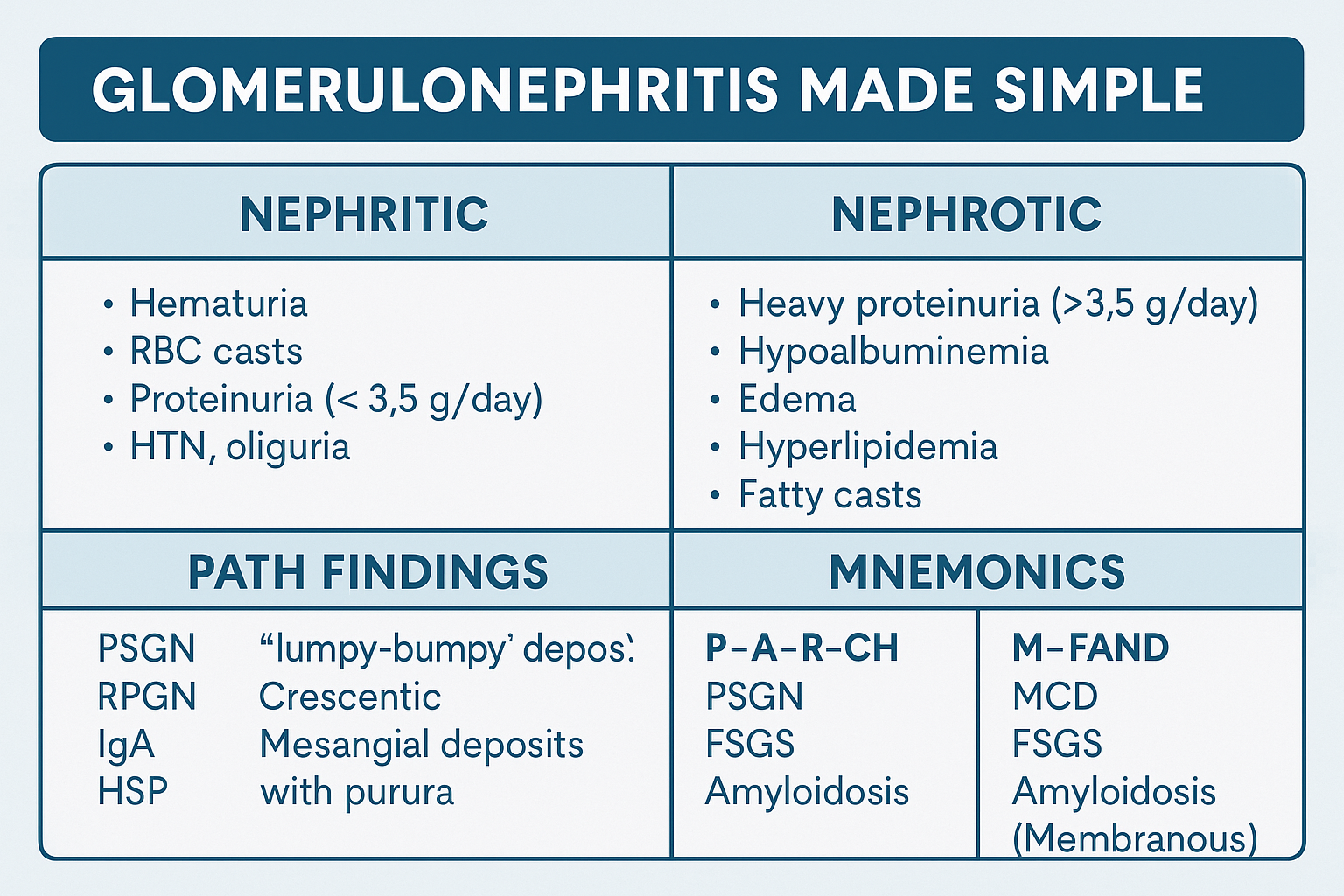🩺 Glomerulonephritis Made Simple: Mnemonics, Pathology, and Clinical Clues
Glomerulonephritis is a classic topic that shows up on Step 1, Step 2 CK, and even Sub-I exams. It’s a dense topic—immune complexes, complement levels, crescents, and patterns galore. Today, we’ll walk you through the core types of glomerulonephritis using visuals, biopsy buzzwords, and mnemonics to help you lock in this topic long-term.
📌 Nephritic vs. Nephrotic Syndromes
Nephritic:
Hematuria
RBC casts
Proteinuria (<3.5g/day)
HTN, oliguria
Nephrotic:
Heavy proteinuria (>3.5g/day)
Hypoalbuminemia
Edema
Hyperlipidemia, fatty casts
📌 Key Rule: Many glomerulonephritides can have features of both.
🧠 Mnemonic for Nephritic Syndromes: “P-A-R-C-H”
P – Post-streptococcal GN
A – Alport syndrome
R – Rapidly progressive GN (RPGN)
C – Crescentic GN
H – Henoch-Schönlein Purpura (IgA nephropathy)
🧠 KOTC Tip: Think “PARCH-ed kidneys bleed”—easy way to remember hematuria + low GFR.
🔍 Biopsy Buzzwords Table
| Disease | Key Biopsy Finding | Notes |
|---|---|---|
| PSGN | "Lumpy-bumpy" IgG, C3 | Subepithelial humps |
| RPGN (Goodpasture's) | Linear IF, anti-GBM | Hemoptysis + hematuria |
| IgA Nephropathy | Mesangial IgA deposits | Often follows URI |
| Lupus Nephritis | Full house IF (IgG, IgA, IgM, C3, C1q) | Associated with SLE |
| Alport Syndrome | Basket-weave GBM on EM | Type IV collagen defect |
🧾 Mnemonic for Nephrotic Syndromes: “M-FAN”
M – Minimal Change Disease (kids)
F – FSGS (African Americans, HIV)
A – Amyloidosis
N – Nephropathy (membranous)
D – Diabetes (nodular sclerosis)
🎯 KOTC Tip: Use “M-FAND out” → as in, you found out their urine is full of protein.
✅ KOTC Tools for Mastering GN
Visual flowcharts for nephritic vs nephrotic workups
“Glomeruli on a Page” reference chart (filter by syndrome)
Quiz sets by biopsy pattern, symptoms, or age group
Adaptive Q-Bank blocks to test retention under time pressure
📌 Before You Go…
Don’t let glomeruli get you down — visualize and gamify your way to mastery.
🎯 Call-to-Action (CTA)
Use KOTC’s renal visuals and adaptive quizzes to conquer one of the most tested systems in med school.
👉 Join the curve now
Frequently Asked Questions (FAQs)
-
Aim for 4-6 focused hours, ensuring you incorporate breaks to avoid burnout.
-
Practice mindfulness techniques, take practice exams under realistic conditions, and maintain a balanced lifestyle.
-
Set short-term goals, seek support from mentors, and reward yourself for small achievements.
-
Regular exercise improves focus, reduces stress, and enhances overall mental clarity.
-
KOTC offers personalized learning tools, gamification features, and adaptive question banks to help students stay on track without burnout.


